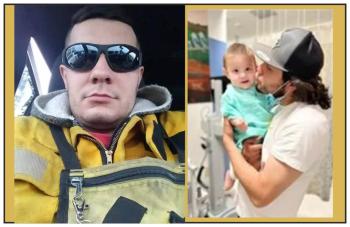Image Caption
Summary
Local Journalism Initiative Reporter
Windspeaker.com
An Indigenous wildland firefighter is in the University of Alberta Hospital with serious injuries.
Frankie Payou was injured on Sunday after a burned tree he was cutting with a chainsaw fell on him. He was involved with firefighting in his home community of East Prairie Métis Settlement in northern Alberta.
According to updated information posted May 15 by Jessica Supernault for a GoFundMe campaign, Payou was airlifted to the Edmonton hospital. He remains in a coma in the ICU with bleeding in his brain, broken ribs, and liver and kidney damage.
Supernault, who is Payou’s girlfriend’s cousin, initially started the GoFundMe because the family, who has three children with a fourth on the way, had lost their home on the settlement.
About 40 structures, including 27 homes, have been lost in the community.
“It just keeps getting worse,” wrote Supernault in her update that spoke of Payou’s circumstances.
Supernault said Payou had been a wildland firefighter for 14 years.
The GoFundMe target of $20,000 was about $3,000 short of meeting its goal as of this afternoon.
Melissa Story with Alberta Wildfire Management Branch confirmed Payou was part of a contract Firetack crew responding to wildfires in his community.
Indigenous firefighters comprise about one-fifth of the approximately 2,500 wildland firefighters tackling the 92 wildfires largely in central and northern Alberta, 26 of which are out of control.
Also included in the numbers of those fighting wildfires are personnel from partner agencies across Canada and the United States, as well as the Canadian Armed Forces, 165 helicopters, 31 fixed-wing aircraft, and heavy equipment.
“As of (May 18), there are 68 Firetack crews deployed in the province, which are primarily Indigenous firefighters,” said Story.
Indigenous firefighters come from both First Nations and Métis communities in Alberta. There are none from outside of the province, she said.
Alberta Wildfire has contracts with at least 29 Indigenous Firetack crews for the 2023 wildfire season.
The remaining 39 Firetack crews have been assembled by contractors, who have hired their services out to Alberta Wildfire.
With Firetack crews consisting of eight members each, Story said 544 Indigenous firefighters are involved in the efforts to battle the wildfires.
To assemble a Firetack crew there are set crew standards required in terms of first aid, chainsaw, and transportation for dangerous goods, said Story.
The Firetack course is an 18-day training program “designed to prepare personnel in the practical and technical skills required to work as a highly trained” wildland firefighter, according to Portage College in Lac La Biche, Alta. which offers the training. The main duties of a Firetack member are sustained action fire containment and initial attack fire suppression.
“All the Indigenous firefighters that we have access to are on the fire line for us,” said Story.
She added that Alberta had a long history of working with Indigenous communities and wildfire crews.
Alberta Wildfire information unit manager Christie Tucker said Wednesday in the daily fire update that news of an injury “is felt by every firefighter.”
She said safety of the firefighters is prioritized and they receive safety training. However, risks to the profession are recognized.
“We're all part of the same firefighting family and nobody wants to see an injury, particularly a bad injury,” said Tucker.
A statement from Indigenous Services Canada May 18, announced active wildfires threatening nine First Nations in Alberta.
Fox Lake, in Little Red River Cree Nation, Sturgeon Lake Cree Nation, Chateh in Dene Tha’ First Nation, have all been evacuated. O’Chiese First Nation is under partial evacuation. There are evacuation alerts for Sucker Creek, Whitefish, Sunchild, and Woodland Cree nations, and Garden River in Little Red River Cree Nation.
There are nine other First Nations identified to be on a watch for threat of wildfire and which have already begun pre-emptive measures.
Peavine Métis Settlement was evacuated May 16.
First Nations in British Columbia, Saskatchewan and Northwest Territories are also being impacted by wildfires. Five First Nations in Saskatchewan were evacuated May 16 and May 17 and five First Nations in British Columbia were evacuated on May 14 and May 15. An evacuation order was issued May 14 to all residents of Kátł’odeeche First Nation in NWT.
Never miss a Windspeaker article. Subscribe Today to our new Windspeaker Newsletter!
Local Journalism Initiative Reporters are supported by a financial contribution made by the Government of Canada.

